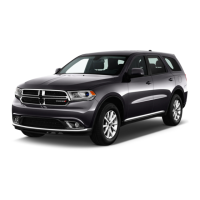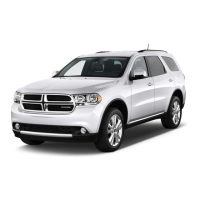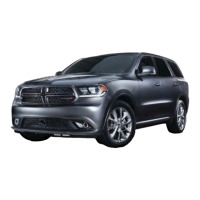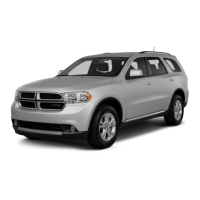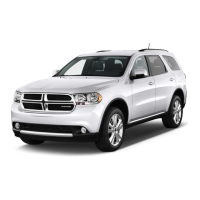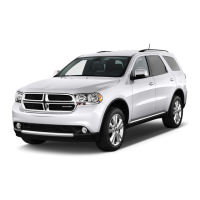Do you have a question about the Dodge DURANGO 2017 and is the answer not in the manual?
Discusses the dangers of driving under the influence of alcohol and provides safety advice.
Emphasizes the increased risk of rollover for utility vehicles and provides safety tips.
Details about vehicle keys, key fobs, and ignition system operation.
Explains the operation and positions of the keyless push button ignition system.
Information on the Sentry Key Immobilizer system that prevents unauthorized vehicle operation.
Details on arming, disarming, and operation of the vehicle's security alarm system.
Explains the functions of the remote keyless entry system for locking/unlocking doors and activating the panic alarm.
Instructions on how to use the remote start system and its features for engine operation.
Details on the passive entry system for keyless vehicle access and operation.
Comprehensive guide on seat belts, airbags, child restraints, and safety precautions for occupant protection.
Explains the blind spot monitoring system, sensor locations, detection zones, and alerts.
Describes the RCP system for detecting vehicles when backing out of parking spaces.
Covers activating, setting, deactivating, and varying speed control functions.
Details on ACC operation, activation, speed settings, cancellation, and distance adjustments.
Explains the FCW system, its operation, warnings, and mitigation features.
Information on LaneSense operation, lane departure warnings, and system status indicators.
Details on ParkSense sensors, warnings, display, and automatic braking features.
Explains the ParkView rear camera, its display, guide lines, and viewing at speed.
Description of the instrument cluster display, including gauges and indicators.
Explains the function and meaning of various warning and indicator lights on the instrument panel.
Details on red warning lights like seat belt and air bag warnings, and their meanings.
Information on yellow warning lights such as engine check, ESC, and low washer fluid indicators.
Covers display location, controls, menu items, and messages displayed.
Guide to accessing and changing customer programmable features via Uconnect system.
Information on Uconnect voice recognition, response length, and command lists.
Details on safety features like backup camera, forward collision warning, and park assist.
How to turn the Forward Collision Warning system on or off and adjust its sensitivity.
Information on ParkSense system operation, alerts, volume, and braking assist.
Step-by-step guide for starting the vehicle, including seat adjustment, belts, and mirror settings.
Explains the operation of the stop/start system, automatic mode, and reasons for engine not autostop ping.
Covers gear selector positions, shift interlock systems, and ECO mode operation.
Overview of the dual hydraulic brake systems and potential loss of capability.
Details on EBD, ABS, BAS, HSA, TCS, ESC, ERM, and related warning lights.
Instructions for using hazard warning flashers as an emergency warning system.
Actions to take to reduce potential for overheating and warnings about hot engine coolant.
Safety warnings and instructions for changing a tire using the vehicle's jack.
Step-by-step instructions for removing the spare tire from its storage location.
Detailed warnings and instructions for safely jacking up the vehicle for tire changes.
Steps for mounting and tightening the road tire after replacement.
Procedures and precautions for jump-starting a vehicle with a discharged battery.
Step-by-step instructions for safely jump-starting the vehicle's battery.
Techniques for freeing the vehicle if stuck in mud, sand, or snow using a rocking motion.
Procedures for towing a disabled vehicle using commercial services or recreational towing methods.
Explanation of the OBD II system, its function, and the Malfunction Indicator Light (MIL).
Importance of using authorized dealers for expert service and access to service manuals.
Overview of required maintenance services and components that may need future attention.
Guidance on checking engine oil level, adding oil, and oil change indicators.
Information on cooling system checks, warnings about hot coolant, and coolant level.
General information on brake system components and the importance of periodic inspection.
Importance of using specified transmission fluid and precautions against chemical flushes.
Information on the automatic oil change indicator system and recommended service intervals.
Required maintenance tasks at specific mileage or time intervals.
Guidance on interacting with authorized dealers and manufacturer customer centers for assistance.
How to report vehicle safety defects to NHTSA and FCA US LLC.
| Brand | Dodge |
|---|---|
| Model | DURANGO 2017 |
| Category | Automobile |
| Language | English |

